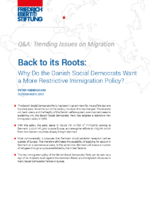Restrictive and Controversial: The New Migration Policy of the Social Democrats in Denmark
Image: Denmark's pride (Denmark #28 Tornby Strand) of Nelson L. licensed under CC BY 2.0
In one year, the Danish parliamentary elections will take place. While most Social Democratic parties in Europe are still searching for a strategy how to deal with the issue of migration, the party seems to have found the answer in a radical and restrictive immigration policy. A strategy paper entitled "Fair and realistic: an immigration policy that brings Denmark together" now clarifies in detail what the party envisions:
- Denmark should establish reception centres outside of Europe. The possibility to apply for asylum on a spontaneous basis should be abolished. This eliminates the opportunity to apply for asylum in Denmark itself or at the Danish border. In return, Denmark would accept refugees according to a quota of the United Nations (UN).
- Stricter conditions also affect family reunification, especially spouses. The party endorses a reform of return mechanisms and the maintenance of border controls.
- Danish development aid for African countries should be linked directly to its immigration policy, based on the model of the Marshall Plan.
- For accepted immigrants in Denmark, various integration measures are earmarked, such as compulsory enrolment in kindergarten and the explicit participation in the labour market. This will ensure that – before receiving any cash considerations or social and integration benefits – immigrants have to contribute to the Danish system.
The Danish Social Democracy plans measures contrary to international law - and receives hardly any criticism in Denmark
In a guest commentary for the FES "Back to its roots: Why do the Danish Social Democrats want a more restrictive immigration policy?", Peter Nedergaard, Professor of Political Science at the University of Copenhagen, analyses the new strategy of the Social Democrats in Denmark. His assessment shows, that the debate in Denmark runs quite differently compared to the European social democratic context.
In fact, the demands of the party are in many respects highly problematic and could violate international law and common agreements. Especially the planned asylum restrictions and reception centres in North Africa trigger criticism. In accordance with international agreements, reception centres for refugees outside Denmark must comply with international standards. These include the human rights minimum standard, for example the non-refoulement principle of the Geneva Refugee Convention. It states that no refugee may be sent back to a country where "his life or freedom would be threatened on account of his race, religion, nationality, membership of a particular social group or political opinion ". However, there is no African state, which neither has been declared as a safe third country, nor offers asylum procedures in line with the rule of law, and it is still very doubtful if this principle can be respected in the nearby future.
Remarkable divergence from social democratic values
Insofar, the proposal of the Danish Social Democrats is remarkable. The party's immigration policy can be seen as a counter movement to the prevailing liberal, immigration-friendly discourse of many social-democratic parties in Europe. Whether this direction can win back the old electorate or instead surrenders social democratic values remains a Danish experiment.
Nedergaard, Peter
Back to its roots
Budapest, 2018
Download (PDF) (230 KB, PDF-File)



